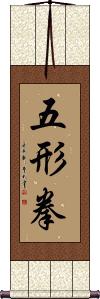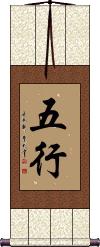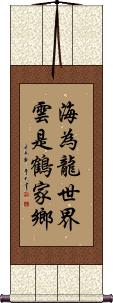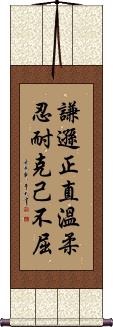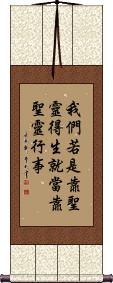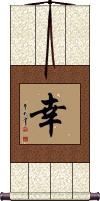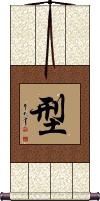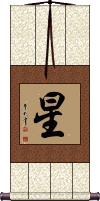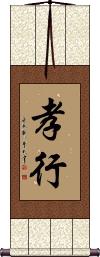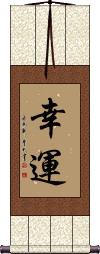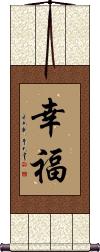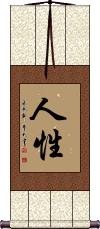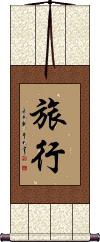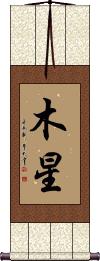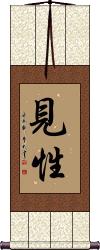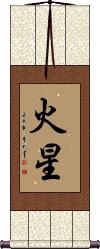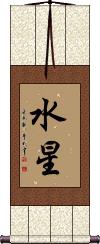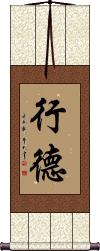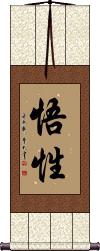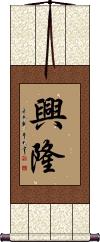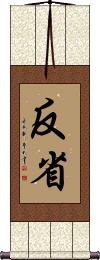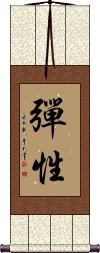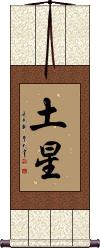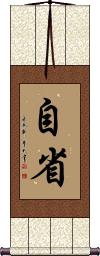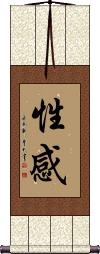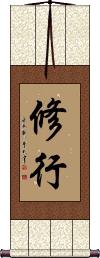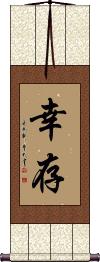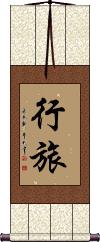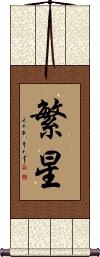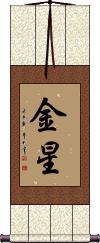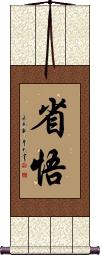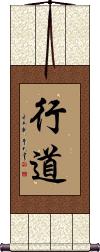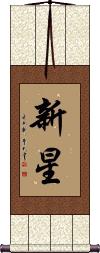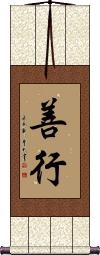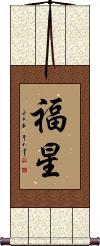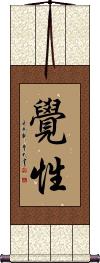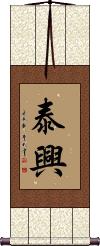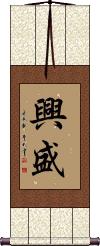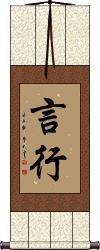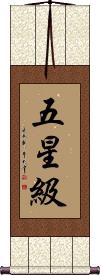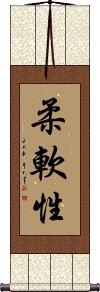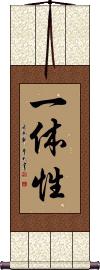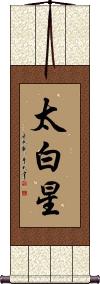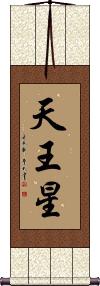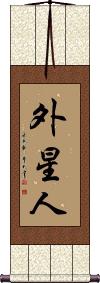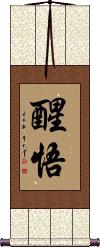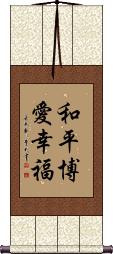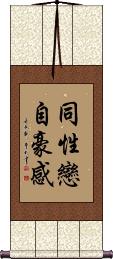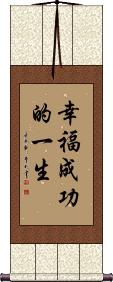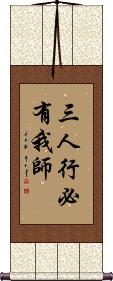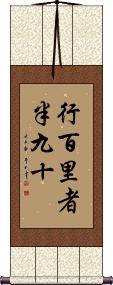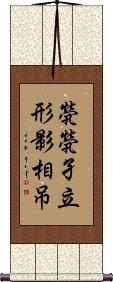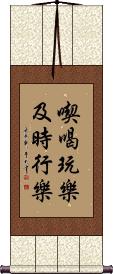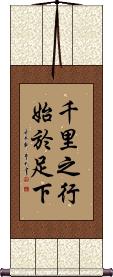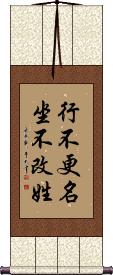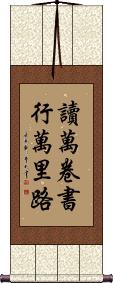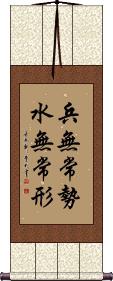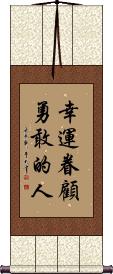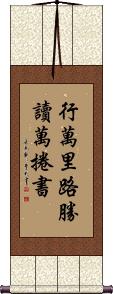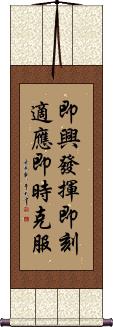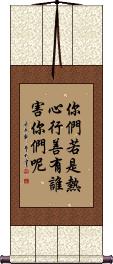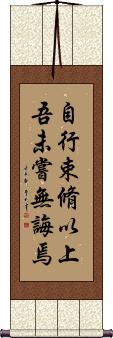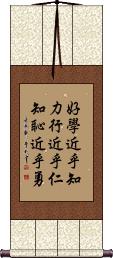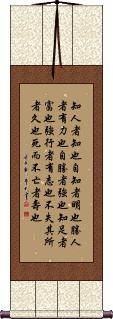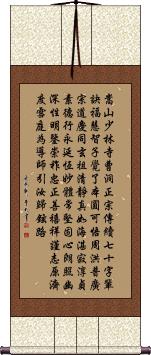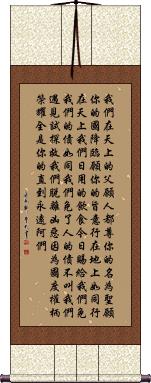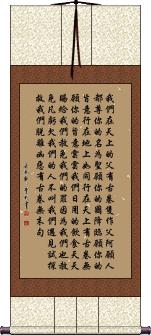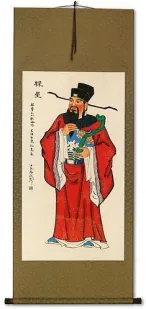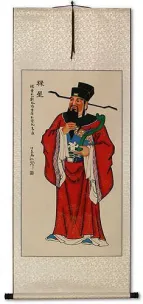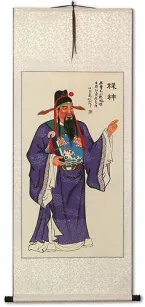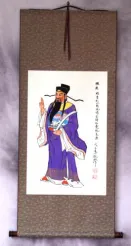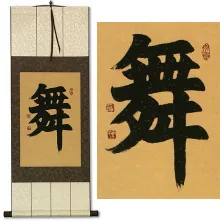Many custom options...
And formats...

Xing in Chinese / Japanese...
Buy a Xing calligraphy wall scroll here!
Personalize your custom “Xing” project by clicking the button next to your favorite “Xing” title below...
1. Wu Xing Fist
2. Xing Yi Quan
4. Star Lotus
5. Every Creature Has A Domain
8. Happiness / Fortune / Lucky
9. Kata
10. Star
11. Filial Piety / Filial Conduct
12. Good Luck
13. Happiness
14. Human Nature
15. Journey / Travel
16. Jupiter
17. Kensho - Initial Enlightenment
18. The Planet Mars
19. Mercury
20. Morality of Deed
21. Power of Understanding and Wisdom
23. Reflect
25. Saturn
26. Introspection / Self-Awareness
27. Sexy
28. Shugyo
29. Survival
30. Traveler / Wanderer / Vagabond / Rolling Stone
34. Walk in the Way
35. Nova
36. Good Conduct
37. Lucky Star
38. The Nature of Enlightenment in One's Mind
39. Tyshing
40. Flourish
41. Words and Deeds
42. Five Star
43. Flexibility
45. Oneness / Unity
46. Planet Venus
47. Pluto
48. Homosexual / Gay
49. Serendipity
50. Spirituality
51. Sun Moon Stars
52. Survivor
53. Uranus
54. Star Man
55. Shapeshifter
56. Reality
57. The Big Dipper / Ursa Major
58. Seeing one’s Nature and becoming a Buddha
63. Kansei Engineering / Sense Engineering
65. Listen to Your Heart / Follow Your Heart
67. Homosexual Male / Gay Male
70. Five Elements Tai Chi Fist
72. Gay Pride
73. 50th Golden Wedding Anniversary
74. A Life of Happiness and Prosperity
75. When Three People Gather, One Becomes a Teacher
76. Walking 100 Miles: Stopping at 90 miles, is the same as stopping half-way
77. Alone with only your shadow for company
79. A Journey of 1000 Miles Begins with a Single Step
81. Read 10,000 Books, Travel 10,000 Miles
82. Warriors Adapt and Overcome
84. Better to Travel 10,000 Miles than Read 10,000 Books
86. 1 Peter 3:13
87. Confucius: Universal Education
88. Learning leads to Knowledge, Study leads to Benevolence, Shame leads to Courage
89. Daodejing / Tao Te Ching - Chapter 33
Wu Xing Fist
Five Forms Fist of Kung Fu
Xing Yi Quan
Style of Martial Arts
形意拳 is the title for the Xingyiquan style/form of Chinese martial arts involving explosive linear movements.
Some translate this as “shape-of-the-mind fist.”
While pronunciation has never changed in Chinese, the old romanization was “Hsing I Chuan.” This romanization for 形意拳 is still used in Taiwan.
This term is used in some Japanese martial arts circles where it's romanized from Japanese as keīken, keiiken, or keiken.
Five Elements
五行 is the title of the five elements: wood, fire, water, earth, and metal.
The first character means five, and the second character is simply element(s).
According to ancient Chinese science, all matter in the world is comprised of these elements. One idea presented with the five elements is that when energy is added, the matter is believed to expand. When energy is removed, matter contracts. Oddly, this concept is not far from Einstein's theories and modern science. Just a few thousand years before Einstein.
More info: Wikipedia - Five Elements (Wu Xing).
See Also: Wood | Fire | Water | Earth | Metal | Five Elements
Star Lotus
星蓮花 is the title Star Lotus in Chinese.
For star lotus, some may write 星荷 instead - especially in Taiwan for reasons I am not sure of. 星荷 is sometimes romanized as “sing he” or “sing ho” though it would be “xīng hé” in mainland pinyin romanization. If you need a particular version or more info, please get in touch with me.
Every Creature Has A Domain
海為龍世界雲是鶴家鄉 is a somewhat poetic way to say that everyone and everything has its place in the world.
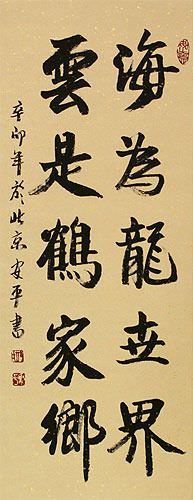 The first line (which is the column on the right) says, “The Ocean is the World of the Dragon.” The next column says, “The Clouds are the Domain of the Cranes.”
The first line (which is the column on the right) says, “The Ocean is the World of the Dragon.” The next column says, “The Clouds are the Domain of the Cranes.”
The image to the right is what this calligraphy can look like in xing-kaishu style by a Master Calligrapher.
Korean CKD Virtues
谦逊正直温柔忍耐克己不屈 are the virtues used by Choi Kwang Do Martial Arts.
| English | Hanja | Hangul | Pronunciation |
| 1. Humility (Humble / Modesty) | 謙遜 | 겸손 | gyeom son |
| 2. Honesty (Integrity) | 正直 | 정직 | jeong jig |
| 3. Gentleness | 溫柔 | 온유 | on yu |
| 4. Perseverance (To Endure) | 忍耐 | 인내 | in nae |
| 5. Self-Control (Self-Restraint) | 克己 | 극기 | geug gi |
| 6. Unbreakable Spirit (Unyielding / Unbending) | 不屈 | 불굴 | bur gur |
The characters shown here are in the ancient Korean Hanja form of writing. If you wish for a Korean Hangul form of these tenets, we can arrange that with our Master Calligrapher Xing An-Ping (click on the Hangul next to the South Korean flag above to order this in Hangul).
Galatians 5:25
If we live in the Spirit, let us also walk in the Spirit
我們若是靠聖靈得生就當靠聖靈行事 is the translation of Galatians 5:25 into Mandarin Chinese via the Chinese Union Bible.
KJV: If we live in the Spirit, let us also walk in the Spirit.
NIV: Since we live by the Spirit, let us keep in step with the Spirit.
The annotation of this Chinese translation:
1.我们 wǒ men - we / us / ourselves
2.若是 ruò shì - if
3.靠 kào - depend upon / lean on / near / by / against / to support
4.圣灵 shèng líng - Holy Ghost
5.得 děi - to have to / must / ought to / degree or possibility
6.生就 shēng jiù - born one way or another (nervous, suspicious, etc.)
7.当 dàng - suitable / adequate / fitting / proper
8.靠 kào - depend upon / lean on / near / by / against / to support
9.圣灵 shèng líng - Holy Ghost
10.行事 xíng shì - how one does things / how one runs things (in this case, it suggests, “to walk in step with”)
Happiness / Fortune / Lucky
幸 can mean happiness, good fortune, good luck, and in the old days, good harvest or bounty.
Note: From Japanese, this character is sometimes romanized as “sachi,” and is often pronounced “kou” or sometimes “rei” when used in compound words with other Kanji.
Kata
型 is often used in Japanese martial arts to mean a certain set of movements and techniques.
The meaning in other contexts (and in Chinese or Korean) can be model, type, style, pattern, mold/mould, template, or form.
One Japanese dictionary defines it as a “standard form of a movement, posture, etc. in martial arts, sport, etc.”
Star
星 is how “star” is written in Chinese, Japanese, and old Korean.
Thousands of years ago, when this character was first developed, there was the belief that you could see remnants of stars in everything. In fact, some early Chinese men of science suggested that all living things came from “stardust” or cosmic debris. This could explain why the upper portion of this character means “sun” (a star itself) and the lower portion means “birth” or “life.”
Oddly enough, modern-day scientists suggest that we are all made up of cosmic dust. Seems they were getting it right in China at a time when the western world thought the Earth was flat and the Church was claiming that the sun and all cosmic bodies revolved around the Earth.
Filial Piety / Filial Conduct
孝行 expresses the idea of filial piety or filial conduct.
While the first character means filial piety by itself, the second character adds “action.” Therefore this represents the actions you take to show your respect and obedience to your elders or ancestors.
Confucius is probably the first great advocate for filial piety.
Good Luck
幸運 can be translated as “good luck,” fortunate, lucky, and/or “good fortune” in Chinese, Korean and Japanese.
Occasionally, this is also translated as a type of happiness or a short way to write serendipity.
Happiness
幸福 is a general state of happiness that can also be translated as truly blessed, welfare, well-being, or fortunate.
Human Nature
人性 is a title that is the essence of what it means to act and be human.
These two characters refer to the way we are as people.
人性 is also sometimes translated as human personality, human instinct, humanity, or humanism.
The first character literally means human or people.
The second character means nature. It can also mean property, quality, attribute, or essence. It can even be a modifier like “-ity” or “-ness,” which is why this word is also translated as “humanity.”
Journey / Travel
旅行 means journey or travels. It is sometimes used to refer to a vacation.
If you like a good adventure, maybe this is the word for you.
Jupiter
木星 is the planet Jupiter in Chinese characters, Japanese Kanji, and old Korean Hanja.
The literal meaning is “wood star.”
This can also be a given name Mokusei or the surname Kiboshi in Japanese.
Kensho - Initial Enlightenment
見性 has the same meaning as Satori but refers to the initial state or initial experience of enlightenment.
This can also mean “self-discovery,” “self-awareness,” or “consciousness of one's character.”
In a very religious context, this means to behold the Buddha nature within oneself.
This term is exclusively used by devout Buddhists. It is not a common term, and is remains an unknown concept to most Japanese and Chinese people. Some Japanese people will dispute whether this title is valid in the Japanese language. Only order this if you are sure this title is right for you.
See Also: Buddhism | Enlightenment
The Planet Mars
火星 is the Japanese Kanji, old Korean Hanja, and Chinese title for the planet Mars.
The characters literally mean “fire star” or “spark.”
Mercury
水星 is the title for the planet Mercury in Chinese, Japanese Kanji, and old Korean Hanja.
The literal meaning is “water star.” This title has been used to refer to Mercury in much of Asia for the past 2200 years or longer.
Morality of Deed
The idea of “morality of deed” goes along with 行德 or “wu de” (martial morality or virtues of the warrior).
Here, the first character is a representation of the actions or deeds that you engage in.
The second character refers to morality or virtue.
This translates better in English in the opposite order, as the Chinese order is literally “deed morality.”
See Also: Morality of Mind | Martial Morality
Power of Understanding and Wisdom
悟性 means the power of understanding and insight in Chinese.
It is often associated with Neo-Confucianism. In that regard, it means to realize, perceive, or have the perception of man's true nature. It can also mean finding your soul, the soul of others, or the soul of the world. Some will translate this simply as the state of being “savvy.”
In Japanese, this is often translated as wisdom and understanding.
Prosperous Business
興隆 is a kind of prosperity that applies to a business. Something great to hang behind your desk if you are a small or large business owner. Doing so says that you either are a booming business or you wish success and prosperity for your business.
Can also be translated as thriving, flourishing, brisk business, and other words related to prosperity in business.
A good meaning in China but is a little antiquated in Japanese.
See Also: Prosperity
Reflect
反省 is the Chinese, Japanese Kanji, and old Korean Hanja means several things, including reflecting upon oneself, examining one's conscience, questioning oneself, searching one's soul, reflection, reconsideration, introspection, meditation, contemplation, regret, repentance, remorse.
Resilience / Flexibility
彈性 means resilience, flexibility, or elasticity in Chinese characters and old Korean Hanja.
Saturn
土星 is the Chinese, Japanese Kanji, and old Korean Hanja for the planet Saturn.
The literal meaning of these characters is “earth star.” The earth character is one of the five elements of Chinese culture. This earth character regards soil or dirt, not the planet Earth.
Saturn has been titled 土星 for at least 2000 years.
Introspection / Self-Awareness
自省 is the Chinese, Japanese Kanji, and old Korean Hanja means: to examine oneself; to reflect on one's shortcomings; introspection; self-awareness; self-criticism; self-examination; reflection.
In Japanese, this can be the given name, Jisei.
Sexy
sex appeal / eroticism / sexuality
Shugyo
修行 is shugyō or shugyou in Japanese. It refers to ascetic practices, training, practice, discipline, and study.
修行 is also a word in the original Chinese, referring more to religious studies and practices.
In the Buddhist context, this represents caryā. In Buddhism, this relates to one's conduct, observing and doing, cultivating oneself in the right practice, and/or being pious.
Survival
Traveler / Wanderer / Vagabond / Rolling Stone
A Vast Sky Full of Stars
Venus / Gold Star
金星 literally means gold star. Most of the time, in the context of the sky, this refers to the planet Venus.
Away from the sky, this can refer to a dazzling victory (e.g. win of a rank-and-file wrestler over the grand champion) or be the Japanese surname Kinboshi.
In the Buddhist context, this is Śukra, from Sanskrit for the planet Venus.
Wake Up to Reality
Walk in the Way
The Way of Buddha Truth
In Taoist and Buddhist contexts, 行道 means to “Walk in the Way.” In Buddhism, that further means to follow the Buddha truth. In some Buddhist sects, this can mean making a procession around a statue of the Buddha (always with the right shoulder towards the Buddha).
Outside of that context, this can mean route (when going somewhere), the way to get somewhere, etc.
In Japanese, this can be the surname or given name Yukimichi.
Nova
Good Conduct
善行 means good actions, good deeds, good conduct, or benevolence.
This can be the given name Yoshiyuki in Japanese.
Lucky Star
The Nature of Enlightenment in One's Mind
Tyshing
泰興 is the name Tyshing or Taixing in Chinese.
This can be the name of Taixing City in Taizhou (泰州), Jiangsu Province in China. There is at least one major corporation using the Tyshing and 泰興 names.
The meaning would most commonly translate as “peaceful feeling,” and with this good meaning can also be a given name in China. 泰興 can also be a given name in Japan where it's romanized as Yasuoki.
Flourish
Words and Deeds
言行 means words and actions, what one says and what one does, speech and behavior, or words and deeds in Chinese, Japanese Kanji, and old Korean Hanja.
Five Star
Flexibility
靈活性 is a Chinese and Korean word that means flexibility or being open to change.
You consider others' ideas and feelings and don't insist on your own way. Flexibility gives you creative new ways to get things done. Flexibility helps you to keep changing for the better. 靈活性 could also be defined as having a “flexible nature.”
See Also: Cooperation
Flexibility
Alternate / Japanese version
柔軟性 is the Chinese, Japanese Kanji, and Korean Hanja word that means “flexibility.”
It can also mean “compatibility,” “pliability,” “softness” and “elasticity.”
See Also: Flexibility | Cooperation
The Planet Neptune
海王星 is the Japanese Kanji, old Korean Hanja, and Chinese title for the planet Neptune.
海王星 literally means “Sea God Star” (all planets end in the character that also means “star”).
Oneness / Unity
This title represents the idea of oneness, unity, integrity, and/or inclusion in Japanese.
The Kanji breakdown:
一 One 体 Body 性 Nature
Note: This word can be understood in Chinese but it more a Japanese word. Best if your audience is Japanese.
Planet Venus
Pluto
冥王星 is the Chinese, Japanese Kanji, and old Korean Hanja for Pluto (the dwarf planet or non-planet that used to be thought of as the 9th planet in the Solar system).
Homosexual / Gay
Homosexual / Gay
同性愛 is a great way to tell your Japanese friends about your lifestyle while keeping your Anglo friends in the dark.
Kind of a huge bold sign to say “I'm Gay” without anybody knowing.
These Kanji characters literally mean “same-sex love.” This phrase would also be understood in Chinese but this combination would act to really emphasize the “love” component to a native Chinese person.
Serendipity
Spirituality
Sun Moon Stars
Survivor
Uranus
天王星 is the Chinese, Japanese Kanji, and old Korean Hanja for the planet Uranus.
Star Man
Shapeshifter
Reality
醒悟 is a Chinese word that expresses the idea of reality or coming to understand what is true and real.
The first character means to wake up, awaken, comprehend, introspect, or visit.
The second character means to comprehend or understand (be enlightened).
The meanings of Chinese words are not necessarily the sum of their parts. In this case, at best, you can derive that the characters express “understanding what is real” or “knowing what is real.” Any Chinese person will perceive this word in a similar way to how we use “reality” in English.
![]() Note: The first character can also be written in a different form as shown to the right. Same meaning in Chinese, either way
it’s
written.
Note: The first character can also be written in a different form as shown to the right. Same meaning in Chinese, either way
it’s
written.
The Big Dipper / Ursa Major
北斗七星 is a Chinese, Japanese Kanji, and old Korean Hanja title for Ursa Major, The Big Dipper, or The Great She-Bear.
You will also see the shorter title of 北斗星, and sometimes just 斗 is used to refer to the dipper when the astrological context is established.
Seeing one’s Nature and becoming a Buddha
見性成佛 is a universal phrase that suggests that one may see one's nature and accomplish Buddhahood.
見性 suggests penetrating deep inside oneself to see one's “Original finally
Mind.”
成佛 refers to a sentient being who dispenses with illusions and delusions
through ascetic practice, is enlightened to the truth, and becomes a Buddha.
This is used by Mahayana, Chan, and Zen Buddhists in China, Korea, and Japan.
You will also see this with the last character written as 仏 in Japanese. In the religious context, 佛 is commonly used to mean Buddha. If you want the other version, see Kenshō Jōbutsu 見性成仏
Enlightened Warrior
覺醒武士 is not a commonly used title in Chinese but is sometimes used in Martial arts and military contexts to refer to a warrior who seems always to be fully aware, enlightened, knowledgeable, noble, and just.
The first two characters are a word that means: to awaken; to come to realize; awakened to the truth; the truth dawns upon one; scales fall from the eyes; to become aware.
The last two characters mean warrior but can also refer to a samurai, soldier, or fighter.
Eternal Happiness
幸福永恆 is a short way to say eternal happiness in Chinese.
Breaking down the parts:
幸福 means happiness, happy, blessed, blessedness, joy, and/or well-being.
永恆 means eternal, everlasting, and/or forever.
Another way to write this is 永恆的幸福. It reverses the word order and adds a possessive article. I prefer the shorter version, which is slightly more natural in Chinese.
Love and Happiness
I walk my own path
Kansei Engineering / Sense Engineering
In short, 感性工學 or Kansei engineering involves collecting data on human experiences with a product and then designing or engineering improvements based on those experiences or “senses.”
Some may define Kansei as “engineering around the human experience.”
There is a lot more to know about Kansei, but if you are looking for this word, you probably already know the big picture.
Note: This term is very new in China and is only used by businesses, factories, and engineers that are implementing TQM principles. While the characters have the same base meaning in both languages, this is a Japanese title that flows back into the Chinese language (in history, most things flowed from China to Japan). To a Chinese person unfamiliar with this concept, they may interpret this as “sense vocational studies,” which doesn't make much sense. You may have to explain the intended meaning to some Chinese viewers. But that can make it a great conversation piece.
Kansei is also a newer term in Korean and is only used in certain parts of the industry, with the definition of “Sensory Engineering.” Not yet in widespread use in Korea.
Above is the modern Japanese version of this title. The last character has a Traditional Chinese version, making this 感性工學 instead of 感性工学. If you want the Traditional Chinese version, please include special instructions or email me so that I make sure the calligrapher writes the version you want.
See Also: Kaizen
Lonely Soul / Solitary
Listen to Your Heart / Follow Your Heart
隨心而行 is the closest way to express this idea in Chinese. Literally translated, this phrase means “Allow your heart to dictate your behavior” or “Let your heart guide your conduct” in Chinese. You could also translate this as “follow your heart.” Or, with a bit of imagination, it could mean: “let your spirit be your guide.”
Note that in some cases, “heart” can mean “mind,” “soul” or even “spirit” in Chinese. In ancient China, it was thought that the big pumping organ in your chest was where your thoughts came from, or where your soul resides.
Ancient western thought followed a similar belief. Thus phrases like “I love you with all my heart” and “I give you my whole heart.”
Pursuit of Happiness
追尋幸福 is the best way to translate the English phrase “pursuit of happiness” into Chinese.
The first two characters mean “to pursue,” “to track down,” or “to search for.”
The last two mean happiness, happy, or being blessed.
See Also: Follow Your Dreams
Homosexual Male / Gay Male
You need the male character in front of the word for homosexual in Chinese to create this word.
It's a much nicer way to say “Gay Male” than English words like Fag, Fairy, Sissy, Puff, Poof, Poofster, Swish, or Pansy. Although I suppose it could be used as a substitute for Nancy Boy, Queer, or Queen (for which, last time I checked, my gay friends said were OK in the right context).
For those of you who think China is a restrictive society - there are at least two gay discos in Beijing, the capital of China. It's at least somewhat socially acceptable to be a gay male in China. However, lesbians seem to be shunned a bit.
I think the Chinese government has realized that the 60% male population means not everybody is going to find a wife (every gay male couple that exists means two more women in the population are available for the straight guys), and the fact that it is biologically impossible for men to give birth, may be seen as helping to decrease the over-population in China.
School of Happiness
The Sun, Moon, and Stars
日月星辰 is a title that encompasses all of the heavenly bodies or celestial bodies.
Namely, this includes the Sun, Moon, and Stars of our universe.
Five Elements Tai Chi Fist
五行太極拳 is a certain school or style of Tai Chi (Taiji).
The characters literally mean “Five Elements Tai Chi Fist.”
Notes:
In Taiwan, it would be Romanized as “Wu Hsing Tai Chi Chuan” - see the standard Mandarin method above in the gray box (used in mainland China and the official Romanization used by the Library of Congress).
The last three characters are sometimes translated as “Grand Ultimate Fist,” so the whole thing can be “Five Elements Grand Ultimate Fist” if you wish.
I have not confirmed the use of this title in Korean but if it is used, it's probably only by martial arts enthusiasts. The pronunciation is correct, as shown above for Korean.
Peace, Love, Happiness
Gay Pride
同性戀自豪感 or “Gay Pride” is a new idea in China. It's so new, that we may have just started the movement by translating this phrase.
If they ever do start having gay pride parades in China, my best guess is that these 6 characters will constitute the term they use to title the parade/movement.
Who knows, maybe in 10 years they will have a pride parade march straight past Tian'anmen Square on Chang An Street (the main drag in Beijing).
50th Golden Wedding Anniversary
幸福金婚 means “Happy Golden Anniversary” and is a great gift for a couple who is celebrating 50 years together.
The first two characters mean happy, blessed, or happiness.
The last two characters mean “couple's golden anniversary.” It means “golden wedding” or “golden marriage,” but this is only used for the 50-year-mark of a marriage (the same way we use gold to represent 50 years in the west).
幸福金婚 is a nice title to use with an inscription. You could request something like, “Happy 50th Anniversary, Mr. and Mrs. Smith,” to be written down the side of this title in smaller Chinese characters.
Please note: This can be pronounced and understood in Japanese but not as commonly used in Japan. Japanese people who read this will understand it but might tend to feel it’s of Chinese origin.
A Life of Happiness and Prosperity
幸福成功的一生 means “A life of happiness and prosperity” or “A life of happiness and success.”
It's a very positive and inspirational wall scroll selection.
See Also: Prosperity
When Three People Gather, One Becomes a Teacher
三人行必有我师 means “when three people meet, one becomes the teacher.”
This famous Chinese philosophy suggests that when people come together, they can always learn from each other.
One person must be the teacher and others learn. And in turn, the others become the teachers of the knowledge they possess.
It is important to remember that we all have something to teach, and we all have something to learn as well.
Walking 100 Miles: Stopping at 90 miles, is the same as stopping half-way
行百里者半九十 is an old Chinese proverb that speaks to the act of giving up. This phrase suggests that no matter how close you are to finishing your task or journey, giving up just before you finish is just as bad as giving up halfway.
50% finished or 90% finished, the result is the same: “You are not finished.”
You can take what you want from this proverb, but I think it suggests that you should finish what you start, and especially finish that last 10% of your journey or project so that you can honestly say “it's finished.”
Some notes: The character, 里, that I am translating as “mile” is an ancient “Chinese mile” which is actually about half a kilometer - it just doesn't sound right to say “When walking 100 half-kilometers...”
Alone with only your shadow for company
煢煢孑立形影相吊 is a Chinese proverb about the state of being as alone as you possibly can be.
It can be translated as “Alone with only your shadow for comfort/company.”
See Also: I Miss You
Eat Drink and Be Merry
喫喝玩樂及時行樂 is just about the closest proverb to match the western idea of “Eat, drink, and be merry.”
This is a Chinese proverb that more literally means “Eat, drink, play, be merry, enjoy everything as long as you can.”
It's basically a suggestion that you try to enjoy everything in life, as long as you live, or as long as you are able.
A Journey of 1000 Miles Begins with a Single Step
Proud Of One’s Name
Read 10,000 Books, Travel 10,000 Miles
讀萬卷書行萬里路 is a lifelong suggestion for expanding your horizons by gaining knowledge, experience, and seeing the world.
Of course, this was written long ago when it was hard to travel 10,000 miles (at least 1000 years before the invention of the airplane).
With air travel and the business I'm in, I often achieve that lifetime goal on a monthly basis.
However, I am a little behind in the book count.
Note: An ancient Chinese mile (里 or lǐ) referred to in this proverb is about a third of a British/American mile. However, at that time, this was a great distance to travel.
Warriors Adapt and Overcome
Soldiers need a fluid plan
This literally translates as: Troops/soldiers/warriors have no fixed [battlefield] strategy [just as] water has no constant shape [but adapts itself to whatever container it is in].
Figuratively, this means: One should seek to find whatever strategy or method is best suited to resolving each individual problem.
This proverb is about as close as you can get to the military idea of “adapt improvise overcome.” 兵無常勢水無常形 is the best way to express that idea in both an ancient way, and a very natural way in Chinese.
Fortune Favors the Bold
Better to Travel 10,000 Miles than Read 10,000 Books
行万里路胜读万卷书 translates a few ways:
To travel ten thousand miles beats reading ten-thousand books.
Better to travel ten thousand li than to read ten thousand books. (a “li” is an ancient Chinese mile)
Traveling thousands of miles is better than reading thousands of books.
No matter how you slice it, this Chinese proverb is claiming that experience is more profound and meaningful than what you can get from a book. Go do it! Don't just read about it.
Improvise Adapt Overcome
即興發揮即刻適應即時克服 is the coolest way to put together this famous word list, “Improvise Adapt Overcome.”
There are shorter ways to write “adapt,” and “overcome,” but “improvise” needs a four-character word to be expressed accurately in Chinese. To match them up, the other two are using four-character words as well. This makes it sound more natural in Chinese (though word lists are not a natural construct in Chinese grammar).
The words break down like this: 即興發揮, 即刻適應, 即時克服. I suggest the 3-column option when you customize your wall scroll. That way, the words will occupy one column each.
A great gift for a U.S. Marine, or anyone who follows this mantra.
1 Peter 3:13
Here is 1 Peter 3:13 in Chinese.
The text with punctuation:
你们若是热心行善,有谁害你们呢?
Hand-painted calligraphy does not retain punctuation.
This translation is from the Chinese Union Bible.
You may know it from the KJV as:
And who is he that will harm you, if ye be followers of that which is good?
Confucius: Universal Education
自行束脩以上吾未尝无诲焉 means, for anyone who brings even the smallest token of appreciation, I have yet to refuse instruction.
Another way to put it is: If a student (or potential student) shows just an ounce of interest, desire, or appreciation for the opportunity to learn, a teacher should offer a pound of knowledge.
This quote is from the Analects of Confucius.
This was written over 2500 years ago. The composition is in ancient Chinese grammar and phrasing. A modern Chinese person would need a background in Chinese literature to understand this without the aid of a reference.
Learning leads to Knowledge, Study leads to Benevolence, Shame leads to Courage
Daodejing / Tao Te Ching - Chapter 33
This is referred to as passage or chapter 33 of the Dao De Jing (often Romanized as “Tao Te Ching”).
These are the words of the philosopher Laozi (Lao Tzu).
To know others is wisdom;
To know oneself is acuity/intelligence.
To conquer others is power,
To conquer oneself is strength.
To know contentment is to have wealth.
To act resolutely is to have purpose.
To stay one's ground is to be enduring.
To die and yet not be forgotten is to be long-lived.
To understand others is to be knowledgeable;
To understand yourself is to be wise.
To conquer others is to have strength;
To conquer yourself is to be strong.
To know when you have enough is to be rich.
To go forward with strength is to have ambition.
To not lose your place is to be long-lasting.
To die but not be forgotten -- that's true long life.
He who is content is rich;
He who acts with persistence has will;
He who does not lose his roots will endure;
He who dies physically but preserves the Dao
will enjoy a long after-life.
Notes:
During our research, the Chinese characters shown here are probably the most accurate to the original text of Laozi. These were taken for the most part from the Mawangdui 1973 and Guodan 1993 manuscripts which pre-date other Daodejing texts by about 1000 years.
Grammar was a little different in Laozi’s time. So you should consider this to be the ancient Chinese version. Some have modernized this passage by adding, removing, or swapping articles and changing the grammar (we felt the oldest and most original version would be more desirable). You may find other versions printed in books or online - sometimes these modern texts are simply used to explain to Chinese people what the original text really means.
This language issue can be compared in English by thinking how the King James (known as the Authorized version in Great Britain) Bible from 1611 was written, and comparing it to modern English. Now imagine that the Daodejing was probably written around 403 BCE (2000 years before the King James Version of the Bible). To a Chinese person, the original Daodejing reads like text that is 3 times more detached compared to Shakespeare’s English is to our modern-day speech.
Extended notes:
While on this Biblical text comparison, it should be noted, that just like the Bible, all the original texts of the Daodejing were lost or destroyed long ago. Just as with the scripture used to create the Bible, various manuscripts exist, many with variations or copyist errors. Just as the earliest New Testament scripture (incomplete) is from 170 years after Christ, the earliest Daodejing manuscript (incomplete) is from 100-200 years after the death of Laozi.
The reason that the originals were lost probably has a lot to do with the first Qin Emperor. Upon taking power and unifying China, he ordered the burning and destruction of all books (scrolls/rolls) except those pertaining to Chinese medicine and a few other subjects. The surviving Daodejing manuscripts were either hidden on purpose or simply forgotten about. Some were not unearthed until as late as 1993.
We compared a lot of research by various archeologists and historians before deciding on this as the most accurate and correct version. But one must allow that it may not be perfect, or the actual and original as from the hand of Laozi himself.
Shaolin Generational Poem
This is a poem, including a title, that celebrates the tactics and virtues of the Shaolin Kung Fu Monks for future generations.
The Lord's Prayer / Mathew 6:9-13
Here is the Lord's Prayer in Chinese from Mathew 6:9-13.
The Chinese text with punctuation is:
Part of 6:9 ...我们在天上的父,愿人都尊你的名为圣。
6:10 愿你的国降临,愿你的旨意行在地上,如同行在天上。
6:11 我们日用的饮食,今日赐给我们。
6:12 免我们的债,如同我们免了人的债。
6:13 不叫我们遇见试探,救我们脱离凶恶,因为国度,权柄,荣耀,全是你的,直到永远,阿们。
Note that punctuation is not included in traditional Chinese calligraphy artwork.
From KJV, this is:
Part of 6:9 ...Our Father which art in heaven, Hallowed be thy name.
6:10 Thy kingdom come. Thy will be done in earth, as it is in heaven.
6:11 Give us this day our daily bread.
6:12 And forgive us our debts, as we forgive our debtors.
6:13 And lead us not into temptation, but deliver us from evil: For thine is the kingdom, and the power, and the glory, forever. Amen.
The Lord's Prayer / Luke 11:2-4
Here is the Lord's Prayer in Chinese from Luke 11:2-4.
The Chinese text with punctuation is:
Part of 11:2 ...我们在天上的父,有古卷只作父阿愿人都尊你的名为圣。愿你的国降临。愿你的旨意行在地上,如同行在天上。有古卷无愿你的旨意云云。
11:3 我们日用的饮食,天天赐给我们。
11:4 赦免我们的罪,因为我们也赦免凡亏欠我们的人。不叫我们遇见试探。救我们脱离凶恶。有古卷无末句。
Note that punctuation is not included in traditional Chinese calligraphy artwork.
From KJV, this is:
Part of 11:2 ...Our Father which art in heaven, Hallowed be thy name. Thy kingdom come. Thy will be done, as in heaven, so in earth.
11:3 Give us day by day our daily bread.
11:4 And forgive us our sins; for we also forgive everyone that is indebted to us. And lead us not into temptation, but deliver us from evil.
This in-stock artwork might be what you are looking for, and ships right away...
Gallery Price: $120.00
Your Price: $69.88
Gallery Price: $120.00
Your Price: $59.88
Lu Xing
God of Money and Prosperity
Wall Scroll
Discounted Blemished
Gallery Price: $71.00
Your Price: $39.00
God of Money and Prosperity
Lu Xing
Wall Scroll
Discounted Blemished
Gallery Price: $53.00
Your Price: $29.00
Not the results for xing that you were looking for?
Below are some entries from our dictionary that may match your xing search...
| Characters If shown, 2nd row is Simp. Chinese |
Pronunciation Romanization |
Simple Dictionary Definition |
型 see styles |
xíng xing2 hsing kata(p); gata かた(P); がた |
More info & calligraphy: Kata(n,n-suf) (1) (がた when a suffix) type; style; model; pattern; (2) mold; mould; model; pattern; template; impression; (3) kata (set sequence of positions and movements in martial arts); style (in kabuki, noh, etc.); form; (4) convention; tradition; (standard) form; formula; usage; (5) (set) size; inches (in sizes of displays, disks, image sensors, etc.); (6) (rare) (See 品種・2) (taxonomical) form |
幸 see styles |
xìng xing4 hsing sachi(p); kou; saki(ok) / sachi(p); ko; saki(ok) さち(P); こう; さき(ok) |
More info & calligraphy: Happiness / Fortune / Lucky(1) good luck; fortune; happiness; (2) (さち only) (See 海の幸,山の幸) harvest; yield; (given name) Rei exactly |
星 see styles |
xīng xing1 hsing hoshi(p); hoshi(sk) ほし(P); ホシ(sk) |
More info & calligraphy: Star(1) star (usu. excluding the Sun); planet (usu. excluding Earth); heavenly body; (2) star (glyph, symbol, shape); asterisk; (3) star (actor, player, etc.); (4) dot; spot; fleck; (5) bullseye; (6) (slang) (police slang; oft. written as ホシ) perp; perpetrator; culprit; offender; suspect; (7) (See 九星) one's star (that determines one's fate); one's fortune; (8) {sumo} point; score; (9) {go} star point (intersection marked with a dot); hoshi; (10) (pyrotechnic) star; (surname) Hotsu Tara, a star; the 25th constellation consisting of stars in Hydra; a spark. |
五行 see styles |
wǔ xíng wu3 xing2 wu hsing gogyou / gogyo ごぎょう |
More info & calligraphy: Five Elements(1) (See 五大・ごだい・1) the five elements (in Chinese philosophy: wood, fire, earth, metal and water); the five phases; wu xing; (2) {Buddh} five practices of the Bodhisattvas; (3) (See 六信五行) the five pillars of Islam; (surname, given name) Gogyou The five lines of conduct. I. According to the 起信論 Awakening of Faith they are almsgiving; keeping the commandments; patience under insult; zeal or progress; meditation. II. According to the 涅槃經 Nirvana Sutra they are saintly or bodhisattva deeds; arhat, or noble deeds; deva deeds; children's deeds (i. e. normal good deeds of men, devas, and Hinayanists); sickness conditions, e. g. illness, delusion, etc.; — into all these lines of conduct and conditions a Bodhisattva enters. III. The five elements, or tanmātra— wood, fire, earth, metal, and water; or earth, water, ire, air, and ether (or space) as taught by the later Mahāyāna philosophy; idem 五大. |
人性 see styles |
rén xìng ren2 xing4 jen hsing jinsei / jinse じんせい |
More info & calligraphy: Human Naturehuman nature; instinct; humanity; humanism |
修行 see styles |
xiū xíng xiu1 xing2 hsiu hsing shugyou(p); sugyou(ok) / shugyo(p); sugyo(ok) しゅぎょう(P); すぎょう(ok) |
More info & calligraphy: Shugyo(noun, transitive verb) (1) training; practice; discipline; study; (noun, transitive verb) (2) {Buddh} ascetic practices; (personal name) Nobuyuki caryā, conduct; to observe and do; to end one's ways; to cultivate oneself in right practice; be religious, or pious. |
反省 see styles |
fǎn xǐng fan3 xing3 fan hsing hansei / hanse はんせい |
More info & calligraphy: Reflect(noun, transitive verb) (1) reflection; reconsideration; introspection; meditation; contemplation; (noun, transitive verb) (2) regret; repentance; remorse; being sorry |
善行 see styles |
shàn xíng shan4 xing2 shan hsing zenkou / zenko ぜんこう |
More info & calligraphy: Good Conduct(noun - becomes adjective with の) (ant: 悪行) good deed; good conduct; benevolence; (given name) Yoshiyuki practice of good deeds |
土星 see styles |
tǔ xīng tu3 xing1 t`u hsing tu hsing dosei / dose どせい |
More info & calligraphy: Saturn{astron} Saturn (planet) 賒乃以室折羅 Śanaiścara. Saturn. Śani, the Hindu ruler of the planet, was "identified with the planet itself ".[Eitel.] |
幸福 see styles |
xìng fú xing4 fu2 hsing fu koufuku / kofuku こうふく |
More info & calligraphy: Happiness(noun or adjectival noun) happiness; well-being; joy; welfare; blessedness; (surname, female given name) Shiawase |
幸運 幸运 see styles |
xìng yùn xing4 yun4 hsing yün yoshikazu よしかず |
More info & calligraphy: Good Luck(noun or adjectival noun) good luck; fortune; (given name) Yoshikazu |
彈性 弹性 see styles |
tán xìng tan2 xing4 t`an hsing tan hsing |
More info & calligraphy: Resilience / Flexibility |
性感 see styles |
xìng gǎn xing4 gan3 hsing kan seikan / sekan せいかん |
More info & calligraphy: Sexy(noun - becomes adjective with の) sexual feelings |
悟性 see styles |
wù xìng wu4 xing4 wu hsing gosei / gose ごせい |
More info & calligraphy: Power of Understanding and Wisdomwisdom; understanding |
新星 see styles |
xīn xīng xin1 xing1 hsin hsing shinsei / shinse しんせい |
More info & calligraphy: Nova(1) {astron} (See ノバ) nova; (2) new face; new star; (surname) Shinhoshi |
旅行 see styles |
lǚ xíng lu:3 xing2 lü hsing ryokou / ryoko りょこう |
More info & calligraphy: Journey / Travel(n,vs,vi) travel; trip; journey; excursion; tour |
木星 see styles |
mù xīng mu4 xing1 mu hsing mokusei / mokuse もくせい |
More info & calligraphy: Jupiter{astron} Jupiter (planet); (given name) Mokusei 勿哩訶婆跋底 Bṛhaspati; 'Lord of increase,' the planet Jupiter. |
水星 see styles |
shuǐ xīng shui3 xing1 shui hsing suisei / suise すいせい |
More info & calligraphy: Mercury{astron} Mercury (planet); (surname) Mizuboshi Mercury |
泰興 泰兴 see styles |
tài xīng tai4 xing1 t`ai hsing tai hsing yasuoki やすおき |
More info & calligraphy: Tyshing(given name) Yasuoki |
火星 see styles |
huǒ xīng huo3 xing1 huo hsing kasei / kase かせい |
More info & calligraphy: The Planet Mars{astron} Mars (planet); (personal name) Ma-su Aṇgāraka, 鴦哦囉迦 the planet Mars. |
省悟 see styles |
xǐng wù xing3 wu4 hsing wu seigo / sego せいご |
More info & calligraphy: Wake Up to Reality(given name) Seigo to reflect and become aware |
福星 see styles |
fú xīng fu2 xing1 fu hsing fukusei / fukuse ふくせい |
More info & calligraphy: Lucky Star(given name) Fukusei |
繁星 see styles |
fán xīng fan2 xing1 fan hsing |
More info & calligraphy: A Vast Sky Full of Stars |
自省 see styles |
zì xǐng zi4 xing3 tzu hsing jisei / jise じせい |
More info & calligraphy: Introspection / Self-Awareness(noun, transitive verb) self-examination; reflection; (given name) Jisei |
興盛 兴盛 see styles |
xīng shèng xing1 sheng4 hsing sheng kousei / kose こうせい |
More info & calligraphy: Flourish(noun/participle) prosperity; flourishing; thriving; (given name) Okimori Prosper, successful. |
興隆 兴隆 see styles |
xīng lóng xing1 long2 hsing lung kouryuu / koryu こうりゅう |
More info & calligraphy: Prosperous Business(n,vs,vi) rise; prosperity; (given name) Kōryū |
行德 see styles |
xíng dé xing2 de2 hsing te gyō toku |
More info & calligraphy: Morality of Deed |
行旅 see styles |
xíng lǚ xing2 lu:3 hsing lü kouryo / koryo こうりょ |
More info & calligraphy: Traveler / Wanderer / Vagabond / Rolling Stone(noun/participle) (1) traveling; travelling; (noun/participle) (2) traveler; traveller |
行道 see styles |
xíng dào xing2 dao4 hsing tao yukimichi ゆきみち |
More info & calligraphy: Walk in the WayTo walk in the way, follow the Buddha-truth; to make procession round an image, especially of the Buddha, with the right shoulder towards it. |
見性 见性 see styles |
jiàn xìng jian4 xing4 chien hsing kenshou / kensho けんしょう |
More info & calligraphy: Kensho - Initial EnlightenmentTo behold the Buddha-nature within oneself, a common saying of the Chan (Zen) or Intuitive School. |
Click here for more xing results from our dictionary
The following table may be helpful for those studying Chinese or Japanese...
| Title | Characters | Romaji (Romanized Japanese) | Various forms of Romanized Chinese | |
| Wu Xing Fist | 五形拳 | gokeiken | wǔ xíng quán wu3 xing2 quan2 wu xing quan wuxingquan | wu hsing ch`üan wuhsingchüan wu hsing chüan |
| Xing Yi Quan | 形意拳 | ke i ken / keiken | xíng yì quán xing2 yi4 quan2 xing yi quan xingyiquan | hsing i ch`üan hsingichüan hsing i chüan |
| Five Elements | 五行 | gogyou / gogyo | wǔ xíng / wu3 xing2 / wu xing / wuxing | wu hsing / wuhsing |
| Star Lotus | 星蓮花 星莲花 | xīng lián huā xing1 lian2 hua1 xing lian hua xinglianhua | hsing lien hua hsinglienhua |
|
| Every Creature Has A Domain | 海為龍世界雲是鶴家鄉 海为龙世界云是鹤家乡 | hǎi wéi lóng shì jiè yún shì hè jiā xiāng hai3 wei2 long2 shi4 jie4 yun2 shi4 he4 jia1 xiang1 hai wei long shi jie yun shi he jia xiang | hai wei lung shih chieh yün shih ho chia hsiang | |
| Korean CKD Virtues | 謙遜正直溫柔忍耐克己不屈 谦逊正直温柔忍耐克己不屈 | qiān xùn zhèng zhí wēn róu rěn nài kè jǐ bù qū qian1 xun4 zheng4 zhi2 wen1 rou2 ren3 nai4 ke4 ji3 bu4 qu1 qian xun zheng zhi wen rou ren nai ke ji bu qu | ch`ien hsün cheng chih wen jou jen nai k`o chi pu ch`ü chien hsün cheng chih wen jou jen nai ko chi pu chü |
|
| Galatians 5:25 | 我們若是靠聖靈得生就當靠聖靈行事 我们若是靠圣灵得生就当靠圣灵行事 | wǒ men ruò shì kào shèng líng shēn jiù dāng kào shèng líng xíng shì wo3 men ruo4 shi4 kao4 sheng4 ling2 dei3 shen1 jiu4 dang1 kao4 sheng4 ling2 xing2 shi4 wo men ruo shi kao sheng ling dei shen jiu dang kao sheng ling xing shi | wo men jo shih k`ao sheng ling tei shen chiu tang k`ao sheng ling hsing shih wo men jo shih kao sheng ling tei shen chiu tang kao sheng ling hsing shih |
|
| Happiness Fortune Lucky | 幸 | saki / sachi / rei / rē | xìng / xing4 / xing | hsing |
| Kata | 型 | kata | xíng / xing2 / xing | hsing |
| Star | 星 | hoshi | xīng / xing1 / xing | hsing |
| Filial Piety Filial Conduct | 孝行 | koukou / koko | xiào xìng xiao4 xing4 xiao xing xiaoxing | hsiao hsing hsiaohsing |
| Good Luck | 幸運 幸运 | kou un / kouun / ko un | xìng yùn / xing4 yun4 / xing yun / xingyun | hsing yün / hsingyün |
| Happiness | 幸福 | koufuku / kofuku | xìng fú / xing4 fu2 / xing fu / xingfu | hsing fu / hsingfu |
| Human Nature | 人性 | rén xìng / ren2 xing4 / ren xing / renxing | jen hsing / jenhsing | |
| Journey Travel | 旅行 | ryokou / ryoko | lǚ xíng / lv3 xing2 / lv xing / lvxing | lü hsing / lühsing |
| Jupiter | 木星 | Mokusei | mù xīng / mu4 xing1 / mu xing / muxing | mu hsing / muhsing |
| Kensho - Initial Enlightenment | 見性 见性 | ken shou / kenshou / ken sho | jiàn xìng jian4 xing4 jian xing jianxing | chien hsing chienhsing |
| The Planet Mars | 火星 | kasei / kase | huǒ xīng / huo3 xing1 / huo xing / huoxing | huo hsing / huohsing |
| Mercury | 水星 | sui shou / suishou / sui sho | shuǐ xīng shui3 xing1 shui xing shuixing | shui hsing shuihsing |
| Morality of Deed | 行德 | xíng dé / xing2 de2 / xing de / xingde | hsing te / hsingte | |
| Power of Understanding and Wisdom | 悟性 | gosei | wù xìng / wu4 xing4 / wu xing / wuxing | wu hsing / wuhsing |
| Prosperous Business | 興隆 兴隆 | kou ryuu / kouryuu / ko ryu | xīng lóng xing1 long2 xing long xinglong | hsing lung hsinglung |
| Reflect | 反省 | hansei / hanse | fǎn xǐng / fan3 xing3 / fan xing / fanxing | fan hsing / fanhsing |
| Resilience Flexibility | 彈性 弹性 | tán xìng / tan2 xing4 / tan xing / tanxing | t`an hsing / tanhsing / tan hsing | |
| Saturn | 土星 | to shou / toshou / to sho | tǔ xīng / tu3 xing1 / tu xing / tuxing | t`u hsing / tuhsing / tu hsing |
| Introspection Self-Awareness | 自省 | jisei | zì xǐng / zi4 xing3 / zi xing / zixing | tzu hsing / tzuhsing |
| Sexy | 性感 | seikan | xing gǎn / xing gan3 / xing gan / xinggan | hsing kan / hsingkan |
| Shugyo | 修行 | shu gyou / shugyou / shu gyo | xiū xíng / xiu1 xing2 / xiu xing / xiuxing | hsiu hsing / hsiuhsing |
| Survival | 幸存 | xìng cún / xing4 cun2 / xing cun / xingcun | hsing ts`un / hsingtsun / hsing tsun | |
| Traveler Wanderer Vagabond Rolling Stone | 行旅 | kou ryo / kouryo / ko ryo | xíng lǚ / xing2 lv3 / xing lv / xinglv | hsing lü / hsinglü |
| A Vast Sky Full of Stars | 繁星 | fán xīng / fan2 xing1 / fan xing / fanxing | fan hsing / fanhsing | |
| Venus Gold Star | 金星 | kinboshi / kinsei | jīn xīng / jin1 xing1 / jin xing / jinxing | chin hsing / chinhsing |
| Wake Up to Reality | 省悟 | shō go / shōgo | xǐng wù / xing3 wu4 / xing wu / xingwu | hsing wu / hsingwu |
| Walk in the Way | 行道 | yukimichi | xíng dào / xing2 dao4 / xing dao / xingdao | hsing tao / hsingtao |
| Nova | 新星 | shinsei / shinhoshi | xīn xīng / xin1 xing1 / xin xing / xinxing | hsin hsing / hsinhsing |
| Good Conduct | 善行 | zenkou / zenko | shàn xíng shan4 xing2 shan xing shanxing | shan hsing shanhsing |
| Lucky Star | 福星 | fukusei | fú xīng / fu2 xing1 / fu xing / fuxing | fu hsing / fuhsing |
| The Nature of Enlightenment in One's Mind | 覺性 觉性 | kakushou / kakusho | jué xìng / jue2 xing4 / jue xing / juexing | chüeh hsing / chüehhsing |
| Tyshing | 泰興 泰兴 | tài xìng / tai4 xing4 / tai xing / taixing | t`ai hsing / taihsing / tai hsing | |
| Flourish | 興盛 兴盛 | kou sei / kousei / ko sei | xīng shèng xing1 sheng4 xing sheng xingsheng | hsing sheng hsingsheng |
| Words and Deeds | 言行 | genkou / genko | yán xíng / yan2 xing2 / yan xing / yanxing | yen hsing / yenhsing |
| Five Star | 五星級 五星级 | wǔ xīng jí wu3 xing1 ji2 wu xing ji wuxingji | wu hsing chi wuhsingchi |
|
| Flexibility | 靈活性 灵活性 | líng huó xìng ling2 huo2 xing4 ling huo xing linghuoxing | ling huo hsing linghuohsing |
|
| Flexibility | 柔軟性 柔软性 | junansei | róu ruǎn xìng rou2 ruan3 xing4 rou ruan xing rouruanxing | jou juan hsing joujuanhsing |
| The Planet Neptune | 海王星 | kaiousei / kaiosei | hǎi wáng xīng hai3 wang2 xing1 hai wang xing haiwangxing | hai wang hsing haiwanghsing |
| Oneness Unity | 一體性 一体性 | ittaisei | yī tǐ xìng yi1 ti3 xing4 yi ti xing yitixing | i t`i hsing itihsing i ti hsing |
| Planet Venus | 太白星 | taihakusei | tài bái xīng tai4 bai2 xing1 tai bai xing taibaixing | t`ai pai hsing taipaihsing tai pai hsing |
| Pluto | 冥王星 | mei ou sei / meiousei / mei o sei | míng wáng xīng ming2 wang2 xing1 ming wang xing mingwangxing | ming wang hsing mingwanghsing |
| Homosexual Gay | 同性戀 同性恋 | tóng xìng liàn tong2 xing4 lian4 tong xing lian tongxinglian | t`ung hsing lien tunghsinglien tung hsing lien |
|
| Homosexual Gay | 同性愛 同性爱 | douseiai / doseiai | tóng xìng ài tong2 xing4 ai4 tong xing ai tongxingai | t`ung hsing ai tunghsingai tung hsing ai |
| Serendipity | 偶然性 | ǒu rán xìng ou3 ran2 xing4 ou ran xing ouranxing | ou jan hsing oujanhsing |
|
| Spirituality | 精神性 | seishinsei / seshinse | jīng shén xìng jing1 shen2 xing4 jing shen xing jingshenxing | ching shen hsing chingshenhsing |
| Sun Moon Stars | 日月星 | nichigetsusei | rì yuè xīng ri4 yue4 xing1 ri yue xing riyuexing | jih yüeh hsing jihyüehhsing |
| Survivor | 倖存者 幸存者 | xìng cún zhě xing4 cun2 zhe3 xing cun zhe xingcunzhe | hsing ts`un che hsingtsunche hsing tsun che |
|
| Uranus | 天王星 | tennousei / tennosei | tiān wáng xīng tian1 wang2 xing1 tian wang xing tianwangxing | t`ien wang hsing tienwanghsing tien wang hsing |
| Star Man | 外星人 | wài xīng rén wai4 xing1 ren2 wai xing ren waixingren | wai hsing jen waihsingjen |
|
| Shapeshifter | 變形者 变形者 | biàn xíng zhě bian4 xing2 zhe3 bian xing zhe bianxingzhe | pien hsing che pienhsingche |
|
| Reality | 醒悟 / 省悟 醒悟 | xǐng wù / xing3 wu4 / xing wu / xingwu | hsing wu / hsingwu | |
| The Big Dipper Ursa Major | 北斗七星 | hoku to shichi sei hokutoshichisei | běi dǒu qī xīng bei3 dou3 qi1 xing1 bei dou qi xing beidouqixing | pei tou ch`i hsing peitouchihsing pei tou chi hsing |
| Seeing one’s Nature and becoming a Buddha | 見性成佛 见性成佛 | ken shou jou butsu kenshoujoubutsu ken sho jo butsu | jiàn xìng chéng fó jian4 xing4 cheng2 fo2 jian xing cheng fo jianxingchengfo | chien hsing ch`eng fo chienhsingchengfo chien hsing cheng fo |
| Enlightened Warrior | 覺醒武士 觉醒武士 | jué xǐng wǔ shì jue2 xing3 wu3 shi4 jue xing wu shi juexingwushi | chüeh hsing wu shih chüehhsingwushih |
|
| Eternal Happiness | 幸福永恆 幸福永恒 | xìng fú yǒng héng xing4 fu2 yong3 heng2 xing fu yong heng xingfuyongheng | hsing fu yung heng hsingfuyungheng |
|
| Love and Happiness | 幸福與愛 幸福与爱 | xìng fú yǔ ài xing4 fu2 yu3 ai4 xing fu yu ai xingfuyuai | hsing fu yü ai hsingfuyüai |
|
| I walk my own path | 我行我素 | wǒ xíng wǒ sù wo3 xing2 wo3 su4 wo xing wo su woxingwosu | wo hsing wo su wohsingwosu |
|
| Kansei Engineering Sense Engineering | 感性工學 感性工学 | kansei kougaku kanseikougaku kansei kogaku | gǎn xìng gōng xué gan3 xing4 gong1 xue2 gan xing gong xue ganxinggongxue | kan hsing kung hsüeh kanhsingkunghsüeh |
| Lonely Soul Solitary | 形單影隻 形单影只 | xíng dān yǐng zhī xing2 dan1 ying3 zhi1 xing dan ying zhi xingdanyingzhi | hsing tan ying chih hsingtanyingchih |
|
| Listen to Your Heart Follow Your Heart | 隨心而行 随心而行 | suí xīn ér xíng sui2 xin1 er2 xing2 sui xin er xing suixinerxing | sui hsin erh hsing suihsinerhhsing |
|
| Pursuit of Happiness | 追尋幸福 追寻幸福 | zhuī xún xìng fú zhui1 xun2 xing4 fu2 zhui xun xing fu zhuixunxingfu | chui hsün hsing fu chuihsünhsingfu |
|
| Homosexual Male Gay Male | 男同性戀 男同性恋 | nán tóng xìng liàn nan2 tong2 xing4 lian4 nan tong xing lian nantongxinglian | nan t`ung hsing lien nantunghsinglien nan tung hsing lien |
|
| School of Happiness | 幸福學校 幸福学校 | xìng fú xué xiào xing4 fu2 xue2 xiao4 xing fu xue xiao xingfuxuexiao | hsing fu hsüeh hsiao hsingfuhsüehhsiao |
|
| The Sun, Moon, and Stars | 日月星辰 | nichigetsuseishin | rì yuè xīng chén ri4 yue4 xing1 chen2 ri yue xing chen riyuexingchen | jih yüeh hsing ch`en jihyüehhsingchen jih yüeh hsing chen |
| Five Elements Tai Chi Fist | 五行太極拳 五行太极拳 | go gyou tai kyoku ken gogyoutaikyokuken go gyo tai kyoku ken | wǔ xíng tài jí quán wu3 xing2 tai4 ji2 quan2 wu xing tai ji quan wuxingtaijiquan | wu hsing t`ai chi ch`üan wuhsingtaichichüan wu hsing tai chi chüan |
| Peace, Love, Happiness | 和平博愛幸福 和平博爱幸福 | hé píng bó ài xìng fú he2 ping2 bo2 ai4 xing4 fu2 he ping bo ai xing fu hepingboaixingfu | ho p`ing po ai hsing fu hopingpoaihsingfu ho ping po ai hsing fu |
|
| Gay Pride | 同性戀自豪感 同性恋自豪感 | tóng xìng liàn zì háo gǎn tong2 xing4 lian4 zi4 hao2 gan3 tong xing lian zi hao gan tongxinglianzihaogan | t`ung hsing lien tzu hao kan tunghsinglientzuhaokan tung hsing lien tzu hao kan |
|
| 50th Golden Wedding Anniversary | 幸福金婚 / 倖福金婚 幸福金婚 | kou fuku kin kon koufukukinkon ko fuku kin kon | xìng fú jīn hūn xing4 fu2 jin1 hun1 xing fu jin hun xingfujinhun | hsing fu chin hun hsingfuchinhun |
| A Life of Happiness and Prosperity | 幸福成功的一生 | xìng fú chéng gōng de yì shēng xing4 fu2 cheng2 gong1 de yi4 sheng1 xing fu cheng gong de yi sheng xingfuchenggongdeyisheng | hsing fu ch`eng kung te i sheng hsingfuchengkungteisheng hsing fu cheng kung te i sheng |
|
| When Three People Gather, One Becomes a Teacher | 三人行必有我師 三人行必有我师 | sān rén xíng bì yǒu wǒ shī san1 ren2 xing2 bi4 you3 wo3 shi1 san ren xing bi you wo shi sanrenxingbiyouwoshi | san jen hsing pi yu wo shih sanjenhsingpiyuwoshih |
|
| Walking 100 Miles: Stopping at 90 miles, is the same as stopping half-way | 行百里者半九十 | xíng bǎi lǐ zhě bàn jiǔ shí xing2 bai3 li3 zhe3 ban4 jiu3 shi2 xing bai li zhe ban jiu shi xingbailizhebanjiushi | hsing pai li che pan chiu shih hsingpailichepanchiushih |
|
| Alone with only your shadow for company | 煢煢孑立形影相吊 茕茕孑立形影相吊 | qióng qióng jié lì xíng yǐng xiāng diào qiong2 qiong2 jie2 li4 xing2 ying3 xiang1 diao4 qiong qiong jie li xing ying xiang diao | ch`iung ch`iung chieh li hsing ying hsiang tiao chiung chiung chieh li hsing ying hsiang tiao |
|
| Eat Drink and Be Merry | 喫喝玩樂及時行樂 吃喝玩乐及时行乐 | chī hē wán lè jí shí xíng lè chi1 he1 wan2 le4 ji2 shi2 xing2 le4 chi he wan le ji shi xing le chihewanlejishixingle | ch`ih ho wan le chi shih hsing le chih ho wan le chi shih hsing le |
|
| A Journey of 1000 Miles Begins with a Single Step | 千里之行始於足下 千里之行始于足下 | qiān lǐ zhī xíng shǐ yú zú xià qian1 li3 zhi1 xing2 shi3 yu2 zu2 xia4 qian li zhi xing shi yu zu xia qianlizhixingshiyuzuxia | ch`ien li chih hsing shih yü tsu hsia chien li chih hsing shih yü tsu hsia |
|
| Proud Of One’s Name | 行不更名坐不改姓 | xíng bù gēng míng zuò bù gǎi xìng xing2 bu4 geng1 ming2 zuo4 bu4 gai3 xing4 xing bu geng ming zuo bu gai xing | hsing pu keng ming tso pu kai hsing | |
| Read 10,000 Books, Travel 10,000 Miles | 讀萬卷書行萬里路 读万卷书行万里路 | dú wàn juǎn shū, xíng wàn lǐ lù du2 wan4 juan3 shu1 xing2 wan4 li3 lu4 du wan juan shu xing wan li lu duwanjuanshuxingwanlilu | tu wan chüan shu hsing wan li lu | |
| Warriors Adapt and Overcome | 兵無常勢水無常形 兵无常势水无常形 | bīng wú cháng shì shuǐ wú cháng xíng bing1 wu2 chang2 shi4 shui3 wu2 chang2 xing2 bing wu chang shi shui wu chang xing | ping wu ch`ang shih shui wu ch`ang hsing ping wu chang shih shui wu chang hsing |
|
| Fortune Favors the Bold | 幸運眷顧勇敢的人 幸运眷顾勇敢的人 | xìng yùn juàn gù yǒng gǎn de rén xing4 yun4 juan4 gu4 yong3 gan3 de ren2 xing yun juan gu yong gan de ren | hsing yün chüan ku yung kan te jen | |
| Better to Travel 10,000 Miles than Read 10,000 Books | 行萬里路勝讀萬捲書 行万里路胜读万卷书 | xíng wàn lǐ lù shèng dú wàn juǎn shū xing2 wan4 li3 lu4 sheng4 du2 wan4 juan3 shu1 xing wan li lu sheng du wan juan shu | hsing wan li lu sheng tu wan chüan shu | |
| Improvise Adapt Overcome | 即興發揮即刻適應即時克服 即兴发挥即刻适应即时克服 | jí xìng fā huī jí kè shì yìng jí shí kè fú ji2 xing4 fa1 hui1 ji2 ke4 shi4 ying4 ji2 shi2 ke4 fu2 ji xing fa hui ji ke shi ying ji shi ke fu | chi hsing fa hui chi k`o shih ying chi shih k`o fu chi hsing fa hui chi ko shih ying chi shih ko fu |
|
| 1 Peter 3:13 | 你們若是熱心行善有誰害你們呢 你们若是热心行善有谁害你们呢 | Nǐ men ruò shì rè xīn xíng shàn yǒu shéi hài nǐ men ne ni3 men ruo4 shi4 re4 xin1 xing2 shan4 you3 shei2 hai4 ni3 men ne ni men ruo shi re xin xing shan you shei hai ni men ne | ni men jo shih je hsin hsing shan yu shei hai ni men ne | |
| Confucius: Universal Education | 自行束脩以上吾未嘗無誨焉 (note 嘗 = 嚐) 自行束脩以上吾未尝无诲焉 | zì xíng shù xiū yǐ shàng wú wèi cháng wú huì yān zi4 xing2 shu4 xiu1 yi3 shang4 wu2 wei4 chang2 wu2 hui4 yan1 zi xing shu xiu yi shang wu wei chang wu hui yan | tzu hsing shu hsiu i shang wu wei ch`ang wu hui yen tzu hsing shu hsiu i shang wu wei chang wu hui yen |
|
| Learning leads to Knowledge, Study leads to Benevolence, Shame leads to Courage | 好學近乎知力行近乎仁知恥近乎勇 好学近乎知力行近乎仁知耻近乎勇 | hào xué jìn hū zhī lì xíng jìn hū rén zhī chǐ jìn hū yǒng hao4 xue2 jin4 hu1 zhi1 li4 xing2 jin4 hu1 ren2 zhi1 chi3 jin4 hu1 yong3 hao xue jin hu zhi li xing jin hu ren zhi chi jin hu yong | hao hsüeh chin hu chih li hsing chin hu jen chih ch`ih chin hu yung hao hsüeh chin hu chih li hsing chin hu jen chih chih chin hu yung |
|
| Daodejing Tao Te Ching - Chapter 33 | 知人者知也自知者明也勝人者有力也自勝者強也知足者富也強行者有志也不失其所者久也死而不亡者壽也 知人者知也自知者明也胜人者有力也自胜者强也知足者富也强行者有志也不失其所者久也死而不亡者寿也 | zhī rén zhě zhī yě zì zhī zhě míng yě shèng rén zhě yǒu lì yě zì shèng zhě qiáng yě zhī zú zhě fù yě qiáng xíng zhě yǒu zhì yě bù zhī qí suǒ zhě jiǔ yě sǐ ér bù wáng zhě shòu yě zhi1 ren2 zhe3 zhi1 ye3 zi4 zhi1 zhe3 ming2 ye3 sheng4 ren2 zhe3 you3 li4 ye3 zi4 sheng4 zhe3 qiang2 ye3 zhi1 zu2 zhe3 fu4 ye3 qiang2 xing2 zhe3 you3 zhi4 ye3 bu4 zhi1 qi2 suo3 zhe3 jiu3 ye3 si3 er2 bu4 wang2 zhe3 shou4 ye3 zhi ren zhe zhi ye zi zhi zhe ming ye sheng ren zhe you li ye zi sheng zhe qiang ye zhi zu zhe fu ye qiang xing zhe you zhi ye bu zhi qi suo zhe jiu ye si er bu wang zhe shou ye | chih jen che chih yeh tzu chih che ming yeh sheng jen che yu li yeh tzu sheng che ch`iang yeh chih tsu che fu yeh ch`iang hsing che yu chih yeh pu chih ch`i so che chiu yeh ssu erh pu wang che shou yeh chih jen che chih yeh tzu chih che ming yeh sheng jen che yu li yeh tzu sheng che chiang yeh chih tsu che fu yeh chiang hsing che yu chih yeh pu chih chi so che chiu yeh ssu erh pu wang che shou yeh |
|
| Shaolin Generational Poem | 嵩山少林寺曹洞正宗傳續七十字輩訣福慧智子覺了本圓可悟周洪普廣宗道慶同玄祖清靜真如海湛寂淳貞素德行永延恆妙體常堅固心朗照幽深性明鑒崇祚忠正善禧祥謹志原濟度雪庭為導師引汝歸鉉路 嵩山少林寺曹洞正宗传续七十字辈诀福慧智子觉了本圆可悟周洪普广宗道庆同玄祖清静真如海湛寂淳贞素德行永延恒妙体常坚固心朗照幽深性明鉴崇祚忠正善禧祥谨志原济度雪庭为导师引汝归铉路 | sōng shān shào lín sì cáo dòng zhèng zōng chuán xù qī shí zì bèi jué fú huì zhì zǐ jiào le běn yuán kě wù zhōu hóng pǔ guǎng zōng dào qìng tóng xuán zǔ qīng jìng zhēn rú hǎi zhàn jì chún zhēn sù dé xíng yong song1 shan1 shao4 lin2 si4 cao2 dong4 zheng4 zong1 chuan2 xu4 qi1 shi2 zi4 bei4 jue2 fu2 hui4 zhi4 zi3 jiao4 le5 ben3 yuan2 ke3 wu4 zhou1 hong2 pu3 guang3 zong1 dao4 qing4 tong2 xuan2 zu3 qing1 jing4 zhen1 ru2 hai3 zhan4 ji4 chun2 zhen1 su4 de2 xing2 yong song shan shao lin si cao dong zheng zong chuan xu qi shi zi bei jue fu hui zhi zi jiao le ben yuan ke wu zhou hong pu guang zong dao qing tong xuan zu qing jing zhen ru hai zhan ji chun zhen su de xing yong | sung shan shao lin ssu ts`ao tung cheng tsung ch`uan hsü ch`i shih tzu pei chüeh fu hui chih tzu chiao le pen yüan k`o wu chou hung p`u kuang tsung tao ch`ing t`ung hsüan tsu ch`ing ching chen ju hai chan chi ch`un chen su te hsing yung sung shan shao lin ssu tsao tung cheng tsung chuan hsü chi shih tzu pei chüeh fu hui chih tzu chiao le pen yüan ko wu chou hung pu kuang tsung tao ching tung hsüan tsu ching ching chen ju hai chan chi chun chen su te hsing yung |
|
| The Lord's Prayer Mathew 6:9-13 | 我們在天上的父願人都尊你的名為聖願你的國降臨願你的旨意行在地上如同行在天上我們日用的飲食今日賜給我們免我們的債如同我們免了人的債不叫我們遇見試探救我們脫離凶惡因為國度權柄榮耀全是你的直到永遠阿們 我们在天上的父愿人都尊你的名为圣愿你的国降临愿你的旨意行在地上如同行在天上我们日用的饮食今日赐给我们免我们的债如同我们免了人的债不叫我们遇见试探救我们脱离凶恶因为国度权柄荣耀全是你的直到永远阿们 | wǒ men zài tiān shàng de fù yuàn rén dōu zūn nǐ de míng wèi shèng yuàn nǐ de guó jiàng lín yuàn nǐ de zhǐ yì xíng zài dì shàng rú tóng xíng zài tiān shàng wǒ men rì yòng de yǐn shí jīn rì cì gěi wǒ men miǎn wǒ men de zhài rú tóng wǒ men miǎn le rén de zhài bù jiào wǒ men yù jiàn shì tàn jiù wǒ men tuō lí xiōng è yīn wèi guó dù quán bǐng róng yào quán shì nǐ de zhí dào yǒng yuǎn ā men wo3 men zai4 tian1 shang4 de fu4 yuan4 ren2 dou1 zun1 ni3 de ming2 wei4 sheng4 yuan4 ni3 de guo2 jiang4 lin2 yuan4 ni3 de zhi3 yi4 xing2 zai4 di4 shang4 ru2 tong2 xing2 zai4 tian1 shang4 wo3 men ri4 yong4 de yin3 shi2 jin1 ri4 ci4 gei3 wo3 men mian3 wo3 men de zhai4 ru2 tong2 wo3 men mian3 le ren2 de zhai4 bu4 jiao4 wo3 men yu4 jian4 shi4 tan4 jiu4 wo3 men tuo1 li2 xiong1 e4 yin1 wei4 guo2 du4 quan2 bing3 rong2 yao4 quan2 shi4 ni3 de zhi2 dao4 yong3 yuan3 a1 men wo men zai tian shang de fu yuan ren dou zun ni de ming wei sheng yuan ni de guo jiang lin yuan ni de zhi yi xing zai di shang ru tong xing zai tian shang wo men ri yong de yin shi jin ri ci gei wo men mian wo men de zhai ru tong wo men mian le ren de zhai bu jiao wo men yu jian shi tan jiu wo men tuo li xiong e yin wei guo du quan bing rong yao quan shi ni de zhi dao yong yuan a men | wo men tsai t`ien shang te fu yüan jen tou tsun ni te ming wei sheng yüan ni te kuo chiang lin yüan ni te chih i hsing tsai ti shang ju t`ung hsing tsai t`ien shang wo men jih yung te yin shih chin jih tz`u kei wo men mien wo men te chai ju t`ung wo men mien le jen te chai pu chiao wo men yü chien shih t`an chiu wo men t`o li hsiung o yin wei kuo tu ch`üan ping jung yao ch`üan shih ni te chih tao yung yüan a men wo men tsai tien shang te fu yüan jen tou tsun ni te ming wei sheng yüan ni te kuo chiang lin yüan ni te chih i hsing tsai ti shang ju tung hsing tsai tien shang wo men jih yung te yin shih chin jih tzu kei wo men mien wo men te chai ju tung wo men mien le jen te chai pu chiao wo men yü chien shih tan chiu wo men to li hsiung o yin wei kuo tu chüan ping jung yao chüan shih ni te chih tao yung yüan a men |
|
| The Lord's Prayer Luke 11:2-4 | 我們在天上的父有古卷隻作父阿願人都尊你的名為聖願你的國降臨願你的旨意行在地上如同行在天上有古卷無願你的旨意雲雲我們日用的飲食天天賜給我們赦免我們的罪因為我們也赦免凡虧欠我們的人不叫我們遇見試探救我們脫離凶惡有古卷無末句 我们在天上的父有古卷只作父阿愿人都尊你的名为圣愿你的国降临愿你的旨意行在地上如同行在天上有古卷无愿你的旨意云云我们日用的饮食天天赐给我们赦免我们的罪因为我们也赦免凡亏欠我们的人不叫我们遇见试探救我们脱离凶恶有古卷无末句 | wǒ men zài tiān shàng de fù yǒu gǔ juǎn zhǐ zuò fù ā yuàn rén dōu zūn nǐ de míng wèi shèng yuàn nǐ de guó jiàng lín yuàn nǐ de zhǐ yì xíng zài dì shàng rú tóng xíng zài tiān shàng yǒu gǔ juǎn wú yuàn nǐ de zhǐ yì yún yún wǒ men rì yòng de yǐn shí tiān tiān cì gěi wǒ men shè miǎn wǒ men de zuì yīn wèi wǒ men yě shè miǎn fán kuī qiàn wǒ men de rén bù jiào wǒ men yù jiàn shì tàn jiù wǒ men tuō lí xiōng è yǒu gǔ juǎn wú mò jù wo3 men zai4 tian1 shang4 de fu4 you3 gu3 juan3 zhi3 zuo4 fu4 a1 yuan4 ren2 dou1 zun1 ni3 de ming2 wei4 sheng4 yuan4 ni3 de guo2 jiang4 lin2 yuan4 ni3 de zhi3 yi4 xing2 zai4 di4 shang4 ru2 tong2 xing2 zai4 tian1 shang4 you3 gu3 juan3 wu2 yuan4 ni3 de zhi3 yi4 yun2 yun2 wo3 men ri4 yong4 de yin3 shi2 tian1 tian1 ci4 gei3 wo3 men she4 mian3 wo3 men de zui4 yin1 wei4 wo3 men ye3 she4 mian3 fan2 kui1 qian4 wo3 men de ren2 bu4 jiao4 wo3 men yu4 jian4 shi4 tan4 jiu4 wo3 men tuo1 li2 xiong1 e4 you3 gu3 juan3 wu2 mo4 ju4 wo men zai tian shang de fu you gu juan zhi zuo fu a yuan ren dou zun ni de ming wei sheng yuan ni de guo jiang lin yuan ni de zhi yi xing zai di shang ru tong xing zai tian shang you gu juan wu yuan ni de zhi yi yun yun wo men ri yong de yin shi tian tian ci gei wo men she mian wo men de zui yin wei wo men ye she mian fan kui qian wo men de ren bu jiao wo men yu jian shi tan jiu wo men tuo li xiong e you gu juan wu mo ju | wo men tsai t`ien shang te fu yu ku chüan chih tso fu a yüan jen tou tsun ni te ming wei sheng yüan ni te kuo chiang lin yüan ni te chih i hsing tsai ti shang ju t`ung hsing tsai t`ien shang yu ku chüan wu yüan ni te chih i yün yün wo men jih yung te yin shih t`ien t`ien tz`u kei wo men she mien wo men te tsui yin wei wo men yeh she mien fan k`uei ch`ien wo men te jen pu chiao wo men yü chien shih t`an chiu wo men t`o li hsiung o yu ku chüan wu mo chü wo men tsai tien shang te fu yu ku chüan chih tso fu a yüan jen tou tsun ni te ming wei sheng yüan ni te kuo chiang lin yüan ni te chih i hsing tsai ti shang ju tung hsing tsai tien shang yu ku chüan wu yüan ni te chih i yün yün wo men jih yung te yin shih tien tien tzu kei wo men she mien wo men te tsui yin wei wo men yeh she mien fan kuei chien wo men te jen pu chiao wo men yü chien shih tan chiu wo men to li hsiung o yu ku chüan wu mo chü |
|
| In some entries above you will see that characters have different versions above and below a line. In these cases, the characters above the line are Traditional Chinese, while the ones below are Simplified Chinese. | ||||
Successful Chinese Character and Japanese Kanji calligraphy searches within the last few hours...
